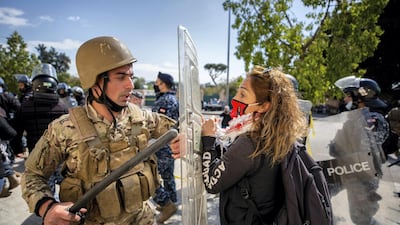US President Joe Biden on Tuesday issued a memorandum intended to provide $47 million in aid to the cash-strapped Lebanese Armed Forces.
The memorandum directs Secretary of State Antony Blinken to begin the process necessary to direct congressionally appropriated funds to Lebanon’s military as rapid inflation continues to put most Lebanese soldiers below the poverty line.
Randa Slim, a senior fellow at the Middle East Institute in Washington, told The National that she expects most of the $47m in aid will go to supplying the Lebanese Armed Forces, freeing up finances for Beirut to increase wages for soldiers.
“The money that is in the [Lebanese Armed Forces] budget for supplies then will be repurposed for salaries,” said Ms Slim. “But the US money is not covering salaries directly.”
Lebanon’s enlisted soldiers currently receive the equivalent of less than $90 per month based on the current exchange rate, as the Lebanese pound continues to plummet against the US dollar.
The UN Security Council asked peacekeepers to provide “non-lethal materials” to the Lebanese military along with greater international support when it extended its peacekeeping mandate last month.
Lebanese Armed Forces commander Joseph Aoun said in July that the financial crisis could cause the military to collapse in a rare video address posted on Twitter.
“How can a soldier support a family with a salary that does not exceed $90?” asked Mr Aoun.
Brig Gen Youssef Haddad told CNBC the same month that the military would need anywhere between $90m to $100m over the next year to help soldiers cover their basic needs, foreseeing that the military will be in “critical condition” by September.

Per the White House memorandum, Mr Blinken must notify Congress of the Biden administration’s intent to reprogramme US government funding to aid the Lebanese military — a politically charged topic on Capitol Hill.
Several pro-Israel members of Congress ardently oppose the US support for the Lebanese Armed Forces, citing Hezbollah’s role in the government.
But officials in the State Department and Pentagon tend to view the Lebanese military as a critical anchor of stability in the region as well as a bulwark against Hezbollah.
Ms Slim said that providing aid in the form of supplies for the Lebanese military, rather than direct military support, could help ease some of the congressional blowback.
“It keeps us at arm’s distance from giving money to salaries with the understanding that the money provided by the US to cover supplies will be covered by an equivalent amount of that money, which should be repurposed from the [Lebanese Armed Forces'] budget towards salaries,” said Ms Slim.
“But it doesn’t put the US government in the business of providing salary support.”
While pro-Israel hardliners on Capitol Hill have consistently introduced legislation to restrict US support for the Lebanese Armed Forces, that legislation consistently failed to advance in previous sessions of Congress.
The House of Representatives passed its fiscal year 2022 foreign aid bill in July, which continues a long-standing provision allowing the US to continue providing aid to the Lebanese Armed Forces.
The Biden administration has proposed $160m in foreign military financing for the Lebanese military for fiscal year 2022.
Even as the depressed wages have resulted in a morale crisis in the military, Lebanese forces used tear gas, water cannons and rubber bullets against protesters last month during demonstrations marking the anniversary of last year’s port blast in Beirut.
The failure of Lebanese politicians to form a new government for over a year means that Lebanon cannot enact the economic reforms needed to unlock vital loans and support from the International Monetary Fund.
In the meantime, the prices of consumer goods, food and fuel continue to skyrocket amid rapid inflation, fuelling popular unrest against the Lebanese political elite.
“Insisting on conditioning future [International Monetary Fund] assistance on reforms is what the US and all the donor community should be adopting,” said Ms Slim. “Otherwise the cycle of corruption with impunity is not going to be broken, and it’s not going to help in the long term.”
“But then you have to couple that with increased humanitarian assistance to help the Lebanese weather the major repercussions on livelihoods on a daily basis.”
In the meantime, other countries have stepped in to provide limited support to Lebanon.
The Lebanese Armed Forces announced on Monday that Jordan had provided it with 11 tonnes of military aid.
Beirut is also working on a deal with Syria, Jordan and Egypt to import electricity and gas through the three countries as the fuel shortages have resulted in frequent, long-lasting power shortages throughout Lebanon.
And Iran has circumvented the caretaker Lebanese government by dispatching two vessels carrying fuel to Lebanon under a deal brokered by a businessman close to Hezbollah, the Iranian-backed paramilitary group.















